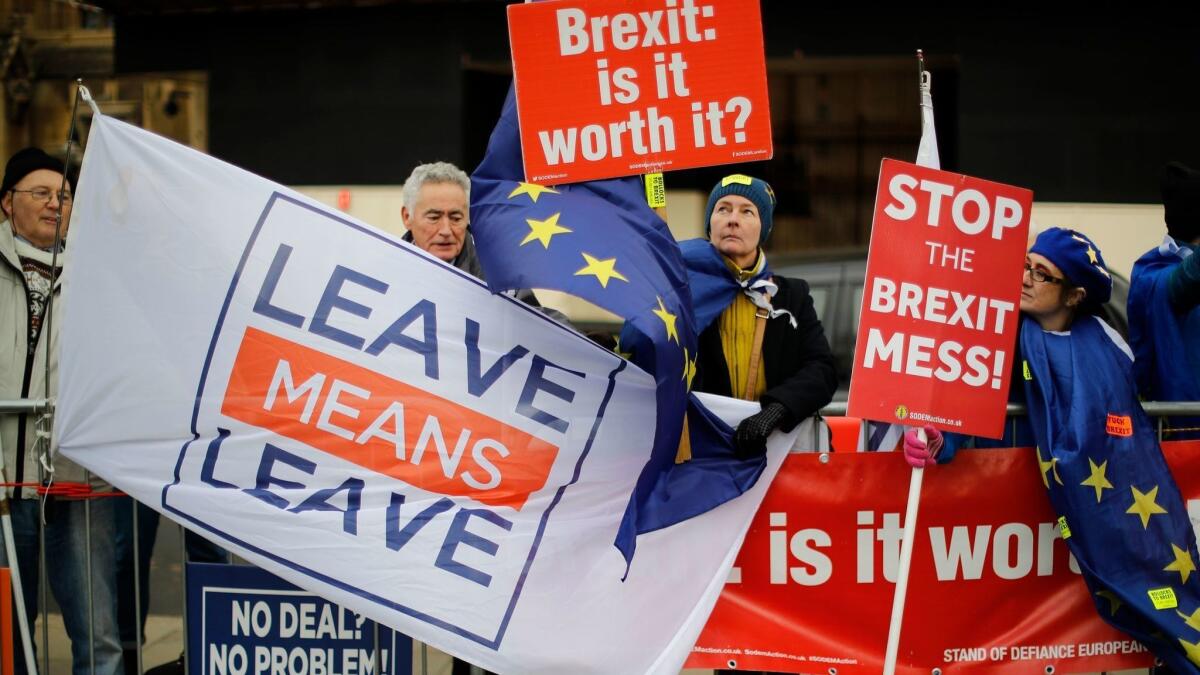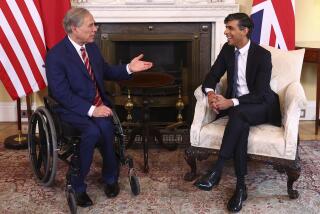If it rejects Brexit deal, Parliament could harm U.K.’s faith in democracy, May warns
On the eve of lawmakers’ vote on her proposed Brexit deal, British Prime Minister Theresa May on Monday urged them to back the plan or risk “catastrophic harm” to the country’s faith in democracy and “paralysis in Parliament.”
Speaking in the city of Stoke-on-Trent, which voted overwhelmingly in 2016 to leave the European Union, May said that if the House of Commons rejects the deal Tuesday, it will significantly increase the chance of Britain crashing out of the EU with no deal on the table — or of Brexit not happening at all.
“We all have a duty to implement the result of the referendum,” the prime minister said during her speech at a pottery factory in central England.
She said of lawmakers who plan to vote against her deal: “I ask them to consider the consequences of their actions on the faith of the British people in our democracy.”
This was May’s last-ditch bid to win over any members of Parliament who are wavering over whether to vote against the government, or support the deal she agreed to following months of negotiations with the remaining 27 EU members.
She also released a letter from EU leaders that attempted to give assurances about one of the biggest sticking points: how to avoid a hard border between the Republic of Ireland, a member of the European Union, and Northern Ireland, which will leave the EU along with the rest of the United Kingdom.
But with the clock ticking down on the Tuesday evening vote, it seems increasingly certain that the arithmetic simply is not in her favor and she will not secure the 320 votes needed to push the deal through. May had already delayed the vote from Dec. 11 to try to increase the odds of passage.
“It would be the surprise of the century if she did win the vote,” said Tim Bale, professor of politics at Queen Mary University of London.
“Maybe [her speech] swayed a few people who were willing to budge anyway. But to be honest, I think everyone’s views are pretty much set now.”
More than two years after the British public voted by a 52% majority to leave the European Union in a nail-biting referendum, the country stands at a critical tipping point.
There are fewer than 75 days left before the March 29 deadline, when Britain is expected to formally leave the bloc, but the gulf between politicians over what that divorce should look like appears wider than ever.
Without a majority in Parliament to depend on, and with May’s own Conservative Party deeply fractured over the issue of what Brexit should look like, if indeed it should happen at all, the prime minister needs support from lawmakers from across the political divide to get her deal through.
Numerous members of the main opposition Labor Party as well as the Liberal Democrats have vowed to vote down the deal, with many of them also calling for a second referendum.
At least 100 of May’s own Conservative members of Parliament have said they will not back her, along with the 10 members of Parliament from the Democratic Unionist Party out of Northern Ireland.
May’s government depends on support from the Democratic Unionists to maintain a parliamentary majority, but they are deeply unhappy with the so-called backstop plan, which seeks to avoid any border reemerging between Ireland and Northern Ireland that could threaten the hard-fought peace process there.
The backstop agreement would come into effect only if Britain and the EU cannot agree to a future trade agreement. Under the current contingency plan, the whole of the U.K. would remain in an EU customs union until a more permanent solution is found. Northern Ireland would remain linked to some rules of the EU single market.
The Democratic Unionists argue that such differences between Northern Ireland and the rest of the U.K. could damage the union. Other critics oppose the fact that the backstop has no time limit and Britain could not leave it unilaterally.

In a further setback Monday, assistant whip Gareth Johnson — who was responsible for trying to get lawmakers to fall into line — resigned his post, saying the Brexit deal was not in the national interest and that he had to place his “loyalty to my country above my loyalty to the government.” More than 10 members of May’s government have quit over Brexit in the 2½ years since she became prime minister.
“I’ve certainly never seen anything like this in my lifetime,” professor Bale said. “And I couldn’t really point to anything after 1945 of this nature. It really is chaos.”
May says she believes the deal delivers on what the British public voted for — it secures the rights of the 3 million EU citizens living in Britain and the 1 million British nationals living in the EU, while also enabling the country to regain control over its borders, money and laws.
But the crux of the deal is a compromise that has fundamentally left no one happy. Die-hard Euroskeptics feel it keeps Britain too closely tied to EU rules, and ardent “remainers” don’t want to sever ties at all.
Former UK Independence Party leader Nigel Farage said he anticipated May would get “one of the biggest parliamentary beatings any British prime minister has ever had in history.”
“Whilst [the deal] says it takes us out of the European Union, it actually leaves us trapped in many aspects of it,” he said.
If May does not secure majority backing for her deal, various scenarios could play out.
May will probably dash to Brussels to seek further assurances and minor tweaks to her deal from EU leaders, although they have repeatedly said that this is the best offer Britain is going to get.
May will have three days to return to Parliament with a Plan B, which could then be voted on.
Labor leader Jeremy Corbyn could call a no-confidence vote in the government; if he won, it could trigger a general election.
Or Brexit could go ahead without a deal, despite prominent business leaders and financial analysts warning that would be a potentially catastrophic outcome for the country’s already shaky economy.
Alternatively, the March 29 deadline could be delayed to allow more negotiating time, an idea that seems to be gaining traction. But that would probably increase calls for a second referendum.
On Monday, protesters in support of the so-called People’s Vote campaign gathered outside Parliament to protest what they see as a disastrous Brexit deal and demand the British public be given the right to vote to either accept the plan or remain in the EU.
In a speech later in the day in the House of Commons, May warned against blocking Brexit: “That would be a subversion of our democracy, saying to the people we were elected to serve that we were unwilling to do what they instructed.”
Of course, there is also the risk that May herself could resign after battling for years to unite the country around a shared vision of Brexit.
“For all the talk of her resilience and doggedness, she’s only human,” Bale said.
“Most other prime ministers, faced with the kinds of humiliations and knock backs she’s had, would have gone months if not a year ago. We’ve got used to the idea that she somehow will never give in, but maybe she will.”
Tuesday’s vote is scheduled to take place about 7 p.m. with a result expected soon after.
Boyle is a special correspondent.
More to Read
Start your day right
Sign up for Essential California for news, features and recommendations from the L.A. Times and beyond in your inbox six days a week.
You may occasionally receive promotional content from the Los Angeles Times.






